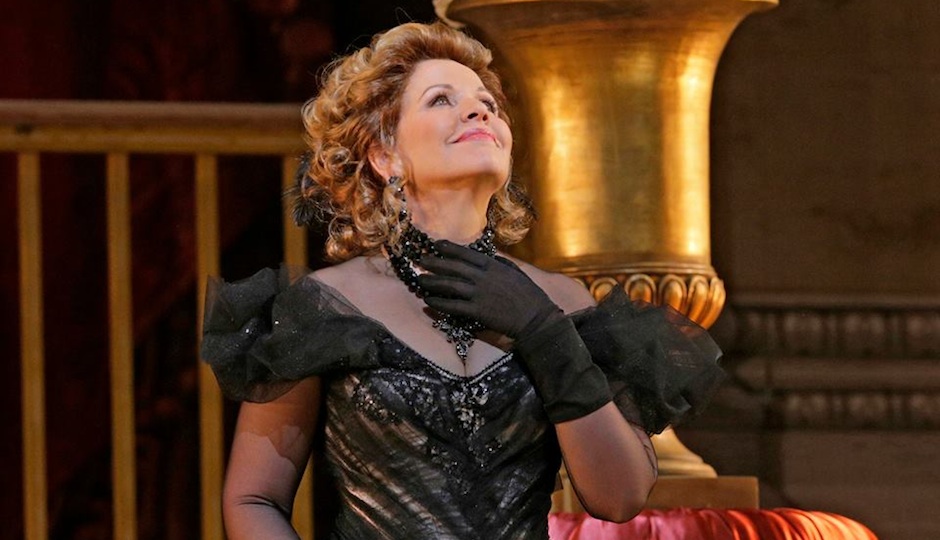Wilmington’s Susan Stroman Makes Sloppy Met Debut in The Merry Widow

Renee Fleming in “The Merry Widow.”
Halfway through a bawdy can-can dance number at Maxim’s, which is supposed to be the height of Susan Stroman‘s new production of The Merry Widow at the Metropolitan Opera, the stage curtains unexpectedly fell this past Tuesday night: There was a major technical malfunction that caused the show to come to a complete halt for nearly 30 minutes. Kelli O’Hara, the Broadway chanteuse making her operatic debut in this Widow, was in a split, held high in the air by her fellow performers. She jokingly shouted, “It’s a party!,” which caused the audience to laugh uncomfortably.
This moment was the first time the opera actually felt alive all evening. Stroman, a Wilmington native and multi Tony winner, makes her Met directorial debut with this production, which opened on New Year’s Eve. Ms. Stroman has been struggling to have a “hit” since her mega successful The Producers swept the Tonys a number of years back, and I’m sad to say that this production isn’t it. The staging feels claustrophobic, unfocused, and almost unfinished at points. Just when you feel like there’s about to be a moment of brilliance, like the all-male chorus line in the second act number “Who Can Tell What the Hell Women Are,” things quickly turn self-conscious and unbalanced.
It doesn’t help that she was stuck with an utterly horrid new English translation of the libretto by Jeremy Sams, who successfully destroyed last year’s Met production of Die Fledermaus, his staging essentially panned by critics. In his translation of The Merry Widow, we’re left to wonder if we’re dealing with a sophisticated romance or a piece of children’s theater. Cheap lines, inappropriate asides, and downright corny dialogue plague the operetta, a story about two former lovers who rekindle their romance amidst political and social fireworks.
You felt downright sorry for the singers and performers who were left to clean up the mess. This particular production was essentially created as a vehicle for it’s leading lady, the great American soprano Renee Fleming, and it’s a shame that she has to suffer through such mediocrity. It’s no secret that Ms. Fleming is nearing the end of her operatic career—despite rumors that she may be returning to the Met stage one final time in a new production of Der Rosenkavalier in 2016— so Widow may very well be the start of her farewell tour, so to speak. Nevertheless, Ms. Fleming handled Hanna, the rich, aristocratic title role, with flair and grace. Her rendition of the “Vilja Song” in act two was clearly the vocal highlight of the evening.
As previously mentioned, Broadway favorite Kelli O’Hara, who triumphed in stagings of South Pacific and The Pajama Game, made her operatic debut in this production. Ms. O’Hara sang well, although sometimes shrill, and added an ounce of reality to the otherwise frivolous character of Valencienne. We saw a true actress here, and the audience ate it up. However, there were again moments where you had to wonder what she could have been capable of if the staging had been better.
The dashing baritone, Nathan Gunn, director of Opera Philadelphia’s American Repertoire Council, was a solid and enjoyable Danilo. Mr. Gunn’s arias, all generally comedic in nature, were performed with gusto and gravitas. Of all of the leading players, Mr. Gunn seemed to have made the most of Ms. Stroman’s messy staging.
Which leads to the hallmark of a Susan Stroman show: the dancing. I was expecting to be blown away by amazing choreography throughout, but the dance numbers were adequate at best. The show opened with a very basic waltz, which was followed by some traditional folk dances in act two, and closed with can-can in the third act. These were all fine, but not what you’d expect from the woman who choreographed Contact, a brilliant all-dance musical that wowed audiences and critics alike. William Ivey Long‘s costumes, although beautiful, weren’t anything to write home about, and Julian Crouch‘s sets were downright boring, two-dimensional flats (isn’t this The Met?).
As the house lights were brought up during the earlier mentioned technical malfunction, audience members were abuzz: “What is going on? What happened?” That’s essentially how I felt about the whole production: How did such an esteemed team of artists create such a lackluster evening? What happened? What is going on?
Philadelphia audiences can see The Merry Widow live in local movie theaters on January 17th. More info can be found here. The production plays at The Met through May 7th, with a change in cast in April. More information can be found here.


